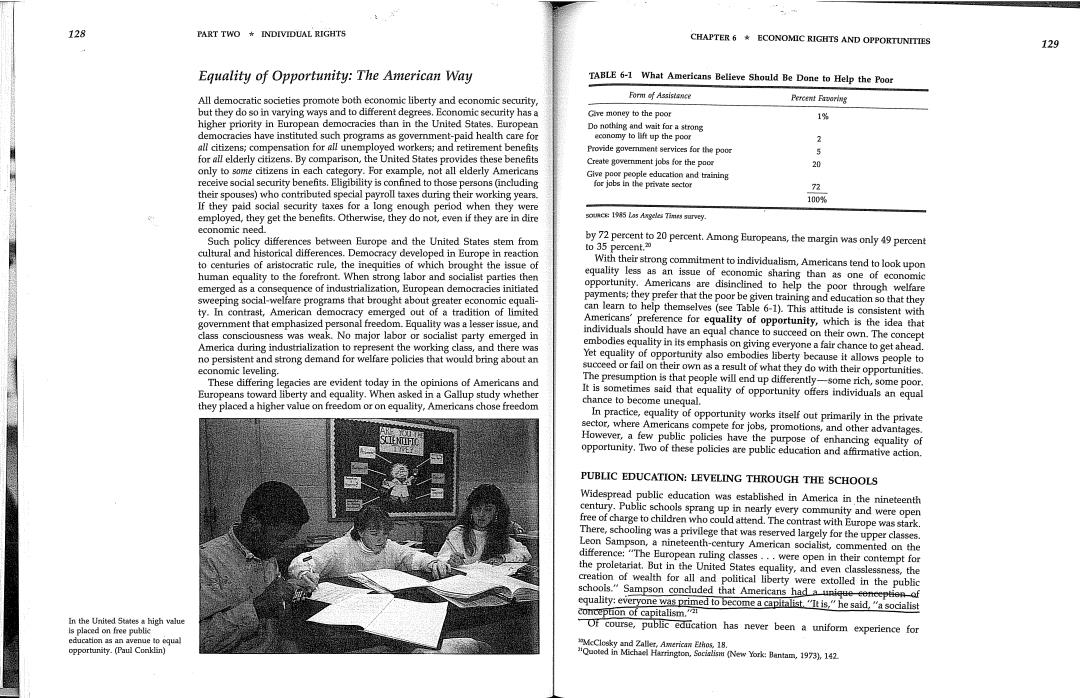正在加载图片...

128 PART TWO INDIVIDUAL RIGHTS CHAPTER 6 ECONOMIC RIGHTS AND OPPORTUNITTES 129 Equality of Opportunity:The American Way TABLE 6-1 What Americans Believe Should Be Done to Help the Poor All democratic societies promote both economic liberty and economic security, Fomt可f Assistance Percent Favoring but they do so in varying ways and to different degrees.Economic security hasa Gve money to the poor 1% higher priority in European democracies than in the United States.European Do nothing and wait for a strong democracies have instituted such programs as government-paid health care for economy to lift up the poor 2 all citizens;compensation for all unemployed workers;and retirement benefits Provide goverment services for the poor 5 for all elderly citizens.By comparison,the United States provides these benefits Create government jobs for the poor 20 only to somie citizens in each category.For example,not all elderly Americans receive social security benefits.Eligibility is confined to those persons (including Give poor people education and training for jobs in the private sector 72 their spouses)who contributed special payroll taxes during their working years. If they paid social security taxes for a long enough period when they were 100% employed,they get the benefits.Otherwise,they do not,even if they are in dire :1985 Las Ange Timts survey. economic need. Such policy differences between Europe and the United States stem from by 72 percent to 20 percent.Among Europeans,the margin was only 49 percent o35 cultural and historical differences.Democracy developed in Europe in reaction to centuries of aristocratic rule,the inequities of which brought the issue of With their strong commitment to individualism,Americans tend to look upon human equality to the forefront.When strong labor and socialist parties then equality less as an issue of economic sharing than as one of economic emerged as a consequence of industrialization,European democracies initiated opportunity.Americans are disinclined to help the poor through welfare sweeping social-welfare programs that brought about greater economic equali- payments;they prefer that the poor be given training and education so that they ty.In contrast,American democracy emerged out of a tradition of limited can learn to help themselves(see Table 6-1).This attitude is consistent with government that emphasized personal freedom.Equality was a lesser issue,and Americans'preference for equality of opportunity,which is the idea that class consciousness was weak.No major labor or socialist party emerged in individuals should have an equal chance to succeed on their own.The concept America during industrialization to represent the working class,and there was embodies equality in its emphasis on giving everyone a fair chance to get ahead. no persistent and strong demand for welfare policies that would bring about an Yet equality of opportunity also embodies liberty because it allows people to economic leveling. succeed or fail on their own as a result of what they do with their opportunities. These differing legacies are evident today in the opinions of Americans and The presumption is that people will end up differently-some rich,some poor Europeans toward liberty and equality.When asked in a Gallup study whether It is sometimes said that equality of opportunity offers individuals an equal they placed a higher value on freedom or on equality,Americans chose freedom chance to become unequal. In practice,equality of opportunity works itself out primarily in the private sector,where Americans compete for jobs,promotions,and other advantages. However,a few public policies have the purpose of enhancing equality of opportunity.Two of these policies are public education and affirmative action. PUBLIC EDUCATION:LEVELING THROUGH THE SCHOOLS Widespread public education was established in America in the nineteenth century.Public schools sprang up in nearly every community and were open free of charge to children who could attend.The contrast with Europe was stark. There,schooling was a privilege that was reserved largely for the upper classes Leon Sampson,a nineteenth-century American socialist,commented on the difference:"The European ruling classes...were open in their contempt for the proletariat.But in the United States equality,and even classlessness,the creation of wealth for all and political liberty were extolled in the public schoois."Sampson concluded that Americans had a unigue-eeneeptien-of equality:everyone was primed to become a capltalist "It is,"he said,"a socialist conception of capitalism." In the United States a high value s placed on free public Of course,public education has never been a uniform experience for education as an avenue to equal opportunity.(Paul Conklin)